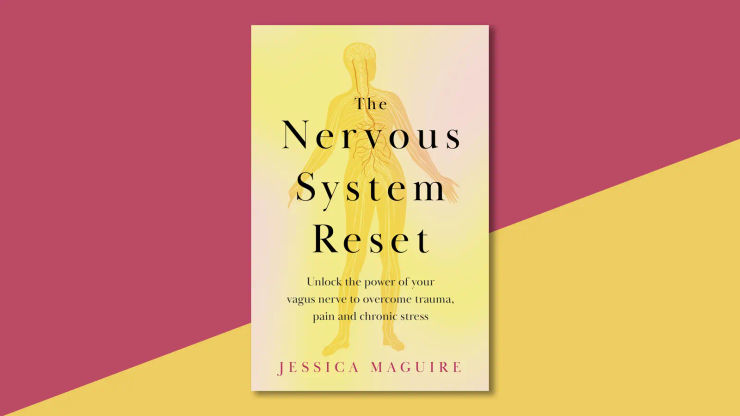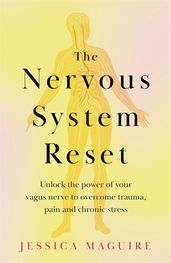What is the vagus nerve and how can you unlock its power?
Having a robust, well-functioning vagus nerve can improve your overall health, says physiotherapist and neurophysiology expert Jessica Maguire.

In her book, The Nervous System Reset, Jessica Maguire explains how understanding and boosting the function of your nervous system can help improve your emotional, digestive and physical health. Key to all of this is your vagus nerve. Here, Jessica explains what the vagus nerve is, and how can you harness it and your nervous system to feel at home in your body again.
Does something feel ‘off’ within your body? Is living with a chronic health problem, either emotional, physical or digestive, making normal life difficult? Have you ever wondered if, or been told that, your problems are all in your head?
I'm here to tell you that it’s not in your head – but it might have something to do with your nervous system.
If you are suffering from any of the below conditions, you might want to start thinking about your vagus nerve:
- IBS
- Anxiety
- Insomnia
- Chronic fatigue
- Inflammation and persistent pain
- Migraines and headaches
- Poor emotional and attentional regulation
These symptoms can be a sign that your vagus nerve isn’t functioning well because the nervous system isn’t balanced.
What is the vagus nerve and what does it do?
The vagus nerve is the two-way communicator between the body and brain. It connects our brain with our most important systems, via our neck, chest, heart and lungs, to our gut. It plays a role in our digestion, heart rate, breathing, cardiovascular activity and reflexes including coughing, sneezing, swallowing, vomiting and even the level of inflammation in our body.
It also plays a major role in our autonomic nervous system (or our inner surveillance system). The vagus nerve slows us back down after we’ve experienced something challenging or threatening – it leads to better health and a calmer, more balanced state of being.
Where is the vagus nerve?
Appropriately named for the Latin word for ‘wandering’, the vagus nerve runs from the base of the skull to the depths of the intestines.
It comprises many different fibres, 80 percent of which are afferent (carrying signals to the brain), and the remainder efferent (carrying signals from the brain to the body).
This information superhighway is comparable in size to the spinal cord, and although it has a single name, it’s really an entire system of its own. At the brainstem, there are two main branches, the ventral vagus nerve and the dorsal vagus nerve.
The ventral vagus nerve connects to structures above the diaphragm (the face, neck, chest and lungs), while the dorsal vagus nerve connects to the organs in the abdomen. In the chest, these two branches subdivide into a cosmos of nerves that span our lungs, heart, diaphragm, stomach, spleen, intestines, colon, liver and kidneys. This network of nerves beams millions of messages to and from the brain, maintaining regulation and sending signals of pain, danger or safety.
How do you know if you have a problem with your vagus nerve?
When our vagus nerve stops functioning as well as it should do, we call this low vagal tone. It often happens after we’ve been through periods of chronic and traumatic stress.
You can't relax or switch off, you startle easily, have racing thoughts, prolonged anxiety or irritation, you're on edge, and emotionally reactive. You’re more likely to experience insomnia or gut issues because you’re chronically in a ‘mobilised’ state.
Or, you may experience depression, forgetfulness, clumsiness, low energy even after enough sleep, and chronic fatigue. Physically you may notice that you experience gut issues and other immune responses.
How do you stimulate the vagus nerve?
Rather than just thinking about stimulating the vagus nerve, consider ways to improve its overall function.
- Cultivate healthy relationships: Surround yourself with supportive people and communities to reap the benefits of co-regulation. This is one of the fastest ways to access the vagus nerve thanks to the ‘social engagement system’.
- Breathe: Engage in deep, diaphragmatic breathing to stimulate the vagus nerve and relax.
- Tune into the body: Pay attention to early signals and sensations to process stress in a healthy way and bring back the vagal brake: a process known as interoception.
- Use bottom-up practices: Understand that willpower alone will not change how you feel – 80 percent of the vagus nerves run upwards from the body to the brain so things like our breathing and movement are powerful ways to help us return to regulation.
- Develop awareness: Use triggers as guides rather than obstacles, to manage stress early so you can proactively manage your emotions.
You’ll find lots more detail and resources in The Nervous System Reset.
What does improving the function of my vagus nerve do?
Improved vagal tone means we can cope with and recover from stress more easily. It makes us better at getting ourselves unstuck when we experience anxiety, anger, despair or apathy, and leaves us better equipped to maintain our equilibrium in the future, even in the face of adversity.
When we prioritise having a healthy, functioning vagus nerve – with good vagal tone – we are more likely to have a resilient and adaptable nervous system. Research has shown an association between high vagal tone and improved health and improved emotional state and cognition.
How can I reset my nervous system?
You can incorporate exercises to train your nervous system, like you would if you were going to the gym to strengthen your body, that are transformative after periods of chronic and traumatic stress.
To understand the complete framework of your nervous system and step back into the driver’s seat, I invite you to read The Nervous System Reset. This will help you understand when you’ve moved into the Too Hot State (known as the sympathetic nervous system) which mobilises your energy towards anxiety or anger. You’ll also recognise if you’ve moved into the Too Cold State (known as the dorsal vagal state) which drains our energy and brings hopelessness and helplessness. The Nervous System Reset also walks you through the resources that help you proactively manage your emotions, and brings you back to the Just Right State.
This is the state where our nervous system and emotions are calm and balanced - where our vagus nerve helps us return to regulation. It’s also the state where our body’s organs and system’s function at their best and allows us to get to the root-cause of some stress-related health conditions.
The more time we learn to spend in the Just Right State, the more resilience we build when facing difficult experiences, both physically and emotionally.
The Nervous System Reset
by Jessica Maguire
Get the tools you need to uncover the power of your nervous system and harness it for improved health. Physiotherapist and neurophysiology expert Jessica Maguire wants to help you understand the root cause of many of our health issues – our dysregulated nervous system. In The Nervous System Reset, Maguire explains why your vagus nerve is key to emotional, digestive and physical health, and how to engage it to help reset your nervous system.



